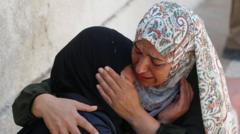The recent conflict between Israel and Iran has ignited after a flurry of military strikes, leading to significant casualties and damaging their critical infrastructures. As U.S. President Donald Trump weighs potential American military support, the fate of nuclear negotiations lies in jeopardy.
Escalating Tensions: Unraveling the Latest Israel-Iran Conflict

Escalating Tensions: Unraveling the Latest Israel-Iran Conflict
Recent military exchanges between Israel and Iran highlight escalated tensions, impacting regional stability and U.S. involvement.
The latest surge of violence between Israel and Iran began on Friday when Israeli forces launched an offensive targeting Iranian nuclear and military facilities, resulting in heavy damage and a reported death toll exceeding 220 according to Iran’s health ministry. In retaliation, Iran unleashed a barrage of ballistic missiles on various Israeli military installations, escalating hostilities that show no immediate signs of abating.
Israel's military operation, termed Operation Rising Lion, specifically aimed at key sites including the Natanz nuclear facility. Prime Minister Benjamin Netanyahu asserted that this operation was essential to dismantle Iran's seemingly advancing nuclear ambitions, claiming they could potentially produce nuclear weapons swiftly if not curtailed. Iran, meanwhile, maintains that its nuclear efforts are purely for peaceful purposes.
Iran’s response to Israel's offensive commenced shortly after with a launch of about 100 missiles targeting multiple Israeli locations. Despite many of these being intercepted by Israel's advanced Iron Dome missile defense system, the exchange of fire continues. Notably, Iranian strikes have targeted civilian areas, including a recent missile strike on Soroka hospital, claimed to be collateral damage in a broader military assault. This event, described by Israeli officials as a direct attack on civilians, only heightened tensions further.
The conflict comes at a precarious moment for international diplomacy, particularly with the U.S. contemplating increased military involvement. President Trump is reportedly considering direct U.S. involvement in targeting Iranian nuclear sites, even as tensions rise over his controversial leadership decisions. Trump’s public condemnation of Iran and insistence on "unconditional surrender" underscores a potential pivot towards military engagement.
The implications of this conflict extend beyond the immediate threats to civilians; it poses significant questions for international nuclear non-proliferation efforts. Iran has faced increasing scrutiny due to ongoing enrichment activities, which have led to accusations from global powers that it veers dangerously close to developing nuclear weapons capability. The International Atomic Energy Agency has expressed concerns over Iran’s nuclear program, citing failures to provide adequate disclosures regarding enriched materials.
As diplomatic pathways fade and military actions escalate, the unfolding Israel-Iran conflict beckons a critical assessment of regional security, U.S. foreign policy, and the effectiveness of long-standing negotiations aimed at curbing Iran’s nuclear aspirations. Global observers watch closely for developments that could reshape the geopolitical landscape in the Middle East.





















